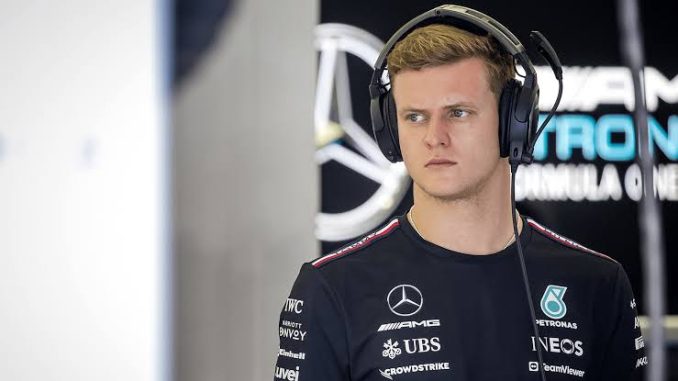
Michael Schumacher, a name synonymous with dominance and resilience in Formula 1, faced an unexpected challenge during his comeback with Mercedes in 2010. The seven-time world champion, revered for his technical expertise and unparalleled ability to adapt, encountered a hurdle that shook even his confidence: simulator sickness.
This revelation, long kept under wraps, offers a glimpse into the human side of one of F1’s greatest legends. For a driver who had conquered the pinnacle of motorsport, the discomfort he experienced in Mercedes’ state-of-the-art factory was both surprising and humbling.
When Schumacher announced his return to Formula 1 in late 2009, the world held its breath. After three years away from the sport, fans and pundits alike were eager to see how the German icon would perform in a new era of F1. Schumacher joined Mercedes’ fledgling team, spearheading their ambitious bid to become a dominant force in the sport.
As part of his preparations, Schumacher spent countless hours in the Mercedes factory, immersing himself in the team’s cutting-edge technology. Among these were the advanced simulators, which had become integral to modern car development and driver training. Unlike the F1 simulators of Schumacher’s heyday in the 1990s and early 2000s, these modern setups featured hyper-realistic visuals and dynamic feedback systems designed to replicate the sensation of driving a Formula 1 car.
However, Schumacher soon discovered that the simulator sessions were far from comfortable. Reports suggest that he experienced nausea and dizziness, symptoms akin to motion sickness. The immersive visuals, combined with the lack of physical movement, created a sensory disconnect that overwhelmed even Schumacher’s ironclad focus.
“I felt ill,” Schumacher reportedly admitted to close confidants during the early months of his return. The simulator’s intense demands took him by surprise, particularly after years away from racing.
For Schumacher, the issue highlighted the rapid evolution of Formula 1 technology during his hiatus. In the early 2000s, simulators were basic tools used primarily for setup experiments and track familiarization. By 2010, they had transformed into sophisticated systems that played a critical role in car design, strategy development, and driver acclimatization.
Schumacher’s discomfort also shed light on the physical and mental demands of simulator training. While younger drivers who had grown up with the technology adapted more easily, seasoned veterans like Schumacher had to adjust to a new era of racing preparation.
The transition wasn’t made any easier by Schumacher’s physical condition. He had sustained a neck injury in a motorcycle accident in 2009, which briefly threatened his return to F1. Though cleared to race, the injury may have heightened his sensitivity to the simulator’s disorienting effects.
Despite these challenges, Schumacher remained undeterred. True to his reputation as a relentless competitor, he worked tirelessly to adapt. Mercedes team insiders recalled his willingness to endure long hours in the factory, even when the simulator sessions proved grueling.
“Michael was never one to back down from a challenge,” said a former Mercedes engineer. “He pushed himself to the limit, not just on the track but behind the scenes. His dedication was unmatched.”
While Schumacher’s on-track results during his Mercedes stint—three seasons from 2010 to 2012—didn’t match the glory of his Ferrari years, his impact on the team was profound. His feedback and work ethic helped lay the foundation for Mercedes’ future dominance, which began in earnest in 2014.
Schumacher’s struggles in the simulator serve as a reminder of the ever-changing nature of Formula 1. Even the greatest drivers are not immune to the challenges posed by new technologies and shifting paradigms.
For fans, the revelation adds a poignant layer to Schumacher’s legendary career. It underscores his humanity and his willingness to confront difficulties head-on.
Today, Schumacher’s story remains an inspiration to drivers and fans alike. While his health battles in recent years have kept him away from the public eye, his legacy as one of the sport’s true icons endures
The incident also offers lessons for the current generation of drivers. Simulator sickness is not uncommon, particularly for those unaccustomed to the immersive setups used in F1. Teams have since developed strategies to mitigate the effects, including gradual acclimatization and improved simulator designs.
For Mercedes, Schumacher’s experience may have spurred advancements in their simulator technology, ensuring that future drivers would face fewer challenges.
As Formula 1 continues to evolve, stories like Schumacher’s remind us that even the best must adapt. It’s a testament to the resilience and determination that define champions.
Michael Schumacher’s return to F1 may not have delivered the victories fans hoped for, but it showcased the strength of character that made him a legend. Even when faced with unexpected challenges, Schumacher proved that the heart of a champion never fades.
In the end, the man who felt “ill” in a simulator went on to inspire a team, a sport, and a generation of racers—a legacy far greater than any single victory.
Leave a Reply